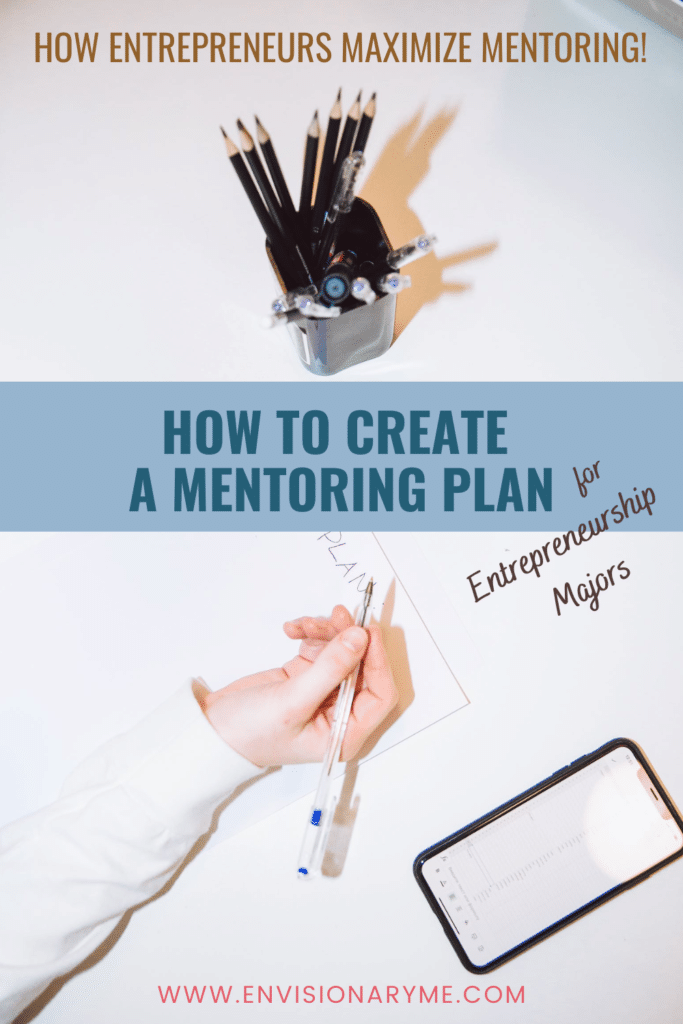Creating a mentorship plan includes a formalized objective-setting process supporting the growth and professional development of the entrepreneurship major. All mentorship programs include the need to write a plan, agree upon strategic activities, timing, and a commitment to see it through. The mentoring relationship is 50/50, and mentors and mentees create the plan together. A successful mentoring program for young entrepreneurs will create a path for them to follow after graduation since they will step foot into the real world after receiving their diploma with no corporate training support or planned guidance. Discussion of career goals is especially important when starting a mentoring program designed for a young entrepreneur. Their goals and activities should support their need for industry knowledge, business planning, and their own next steps.

Mentorships are mutually fulfilling opportunities for entrepreneurial mentees and mentors! The first steps in a successful program are to get to know each other, then using the learnings gained in that initial conversation to create a mentorship plan.
Mentorship programs share the same goal of supporting and developing mentees, but each program is as unique as the mentees themselves. This is particularly true for entrepreneurship majors.
Creating a formal plan ensures objectives are discussed and evaluated, goals are set, timing is agreed upon, and activities are planned to support goal achievement. In addition, mutual commitment and agreement to communicate, provide feedback, and follow through on planned actions help ensure program success.
Writing a mentorship plan helps ensure successful a mentorship program outcome.
Mentees working through a corporate or school mentorship program are typically provided with a starting point, structure, and expectations. In these instances, the companies and schools often provide a list of willing mentors too; this often saves time and helps ensure a successful mentoring program where the mentees are able to achieve their goals.
Entrepreneurs or mentees developing their own program need a starting point too. Networking, using family relationships and other people you know can help you create a list of potential mentors.
As an entrepreneurship student, you are creative and resourceful. Options such as these can help you find and develop a mentor-mentee relationship and then create an effective mentoring program. People will want to help you. Ask for ideas, references, and introductions.
- alumni groups and programs
- networking groups relating to your field
- online programs to support new business owners
- online mentoring businesses
A goal without a plan is just a wish. You don’t have time to simply wish.
Get to work!

Technically speaking,
Your mentorship program will have four distinct phases:
Phase 1. Getting Acquainted
- Get to know each other.
- Discuss mutual expectations.
- Set the groundwork for communication and next steps.
Phase 2. Creating the mentorship plan and mentorship goal setting
- Create the framework for the mentorship plan.
- Set goals using a SMART goal template.
- Agree upon timing as it relate to goals & activities and immediate next steps.
- Ensure mentor and mentee mutual commitment.
Phase 3. Mentee development
- Actively work toward the objectives.
- Learn, practice, and assess.
Phase 4. Closure
- Assess where the mentee is today.
- Agree upon the next steps.
- Give thanks.

Our focus is on Phase 2: Creating the mentorship plan and mentorship goal setting.
Do not skip this planning process. It’s not meant to overwhelm you. It’s not meant to be given an eye roll.
Your plan provides structure, timing, and the details of your agreement. It helps ensure commitment, follow-through, and your success.
Your mentorship process has a defined beginning and end; your plan outlines what is expected to happen in between.
Steps to creating a mentorship plan include:
- Create the framework for the mentorship plan.
- Set goals using a SMART goal template.
- Agree upon timing as it relates to goals & activities and immediate next steps.
- Ensure mentor and mentee mutual commitment.
Step 1: Create the framework for the mentorship plan.
Start your action plan with a brief discussion.
- Discuss your short-term and long-term career goals. If your immediate next steps after receiving your diploma are completely undetermined, then you have uncovered a mentorship goal. If you have a short-term plan set up but need a certain skill or focus to help to step toward your long-term goal, then place your mentor’s focus there.
- Throughout your mentorship, you want to ask questions. Mentors are passionate about helping. Allow them to do so.
- Agree on your primary mentorship program objective. You’ll build your SMART goals to achieve this objective.
Use a written form. Any form.
- Capture as much detail as you want, but write it in a notebook, confirm it in an email, or keep it in your notes app. Capture it however is best for you, but both the mentor and mentee should have a copy.
- Using metacognition is helpful. Understanding your own thought processes and what type of activity and communication actually motivates you will help you craft a plan where you will follow through.
Mentors are not there to change your style; they are there to help you build your skills and knowledge. If a certain type of communication or activity doesn’t work for your style or interests or needs, speak up. It’s your plan.

STEP 2: Set goals using a SMART goal template.
Set 2-4 goals.
- A single goal may require multiple activities, so the number of goals is less important than what you learn.
- You want the program to be worthwhile and achievable – but not stressful.
Set SMART goals.
- SMART: Specific. Measurable. Attainable. Relevant. Time-based.
- Do you want to change the acronym? Don’t debate it. Just do it. Just make sure the goals meet these general criteria.
- If a different technique works for you, utilize it. Your mentorship is a safe space. Do what’s necessary to support growth within this time.

STEP 3: Agree upon timing as relates to goals & activities, and immediate next steps.
Agree upon the timing of the goals and activities.
- The mentor program begins when a mentor and mentee agree to partner.
- The program ends when the formal program dictates or when the mentor and mentee agree it will end, which is typically 3-6 months.
- Realize mentorships programs vary in setup and formality. Where a mentorship involving a long learning period may be 6 months, a flash mentoring session may be a single hour.
After setting your goals, agree upon immediate next steps.
- When and how will you meet next? You might meet in person, virtually, or find you communicate well through the phone or email. There is no rule, but the next steps should be clearly defined.
What action is required by both you and your mentor prior to meeting?
- Determine the action required.
- Plan to follow through.
STEP 4: Ensure mentor and mentee’s mutual commitment
Ensure mutual commitment.
If the mentor or mentee fails to follow through on their commitment, the mentorship falls apart, and the mentee does not achieve the goals. Maybe that doesn’t seem like a big deal. If you need help creating that next step though, mutual commitment is the only way you’ll get there. Choose to set yourself up for success.
- You may both formally sign the mentorship plan document.
- You may shake hands.
- You may simply agree.
Have a backup plan.
A formal mentoring program can change as you go through the process. Ask questions. Share thoughts. If you or your mentor are not dedicated enough to have an open conversation, you are not ideal partners. Neither one of you has time to waste, so be honest with each other.
- Do you each have your next meeting on your calendar already with reminders set? You should.
- What happens if one of you doesn’t show up? How long does the other person wait? What if the no-show person doesn’t respond? Trust erodes very quickly. In advance, do you agree to immediately reschedule if this happens?
- What happens if you were meeting in person on the 1st and your mentor cancels? Will your mentor commit to a focused telephone call instead?
- What happens if you don’t follow through on an activity because of an unexpected school project? Do you meet with your mentor just to say “I didn’t do it?”
Leadership skills come into play immediately when you are discussing commitment!
Both the mentor and mentee are stakeholders in this mentoring process. It’s the mentee’s career, yes, but mentorship programs offer growth and development as well as valuable lessons for both parties.
Move forward knowing a formalized mentoring plan is critical to YOUR career development. Your mentorship program will be brief, so maximize your time and your opportunities for growth.
This formal, written agreement between you and your mentor ensures alignment on defined goals. It also ensures agreement on factors such as how often you will meet, what each of your goals are for the relationship, and how long you’ll spend working toward your goals. Assumptions create disconnects, which then lead to dissatisfaction for both parties. The plan eliminates assumption.
Remember, mentors and mentees are equally vested in this process. Your learnings must be real and able to positively impact your future, and mentors want to make a difference for you. Consider this hour of your time a worthwhile investment.
Go! Get started! Success awaits!

0 Comments